Hayes, Conyngham & Robinson Pharmaceutical Chemists Archive Collection
RCSI Heritage Collections, Dublin
By: Erin McRae, Project Cataloguing Archivist
The archival collection was donated in October 2023 to the Royal College of Surgeons in Ireland (RCSI)’s Heritage Collections by two great-grandsons of Henry Conyngham, Michael and Christopher Shiell, both of whom worked in the company as joint managing directors before the sale of the company to Boots in 1998. Once a project archivist was appointed the collection was appraised, catalogued and made available to researchers. The collection was recently showcased as part of National Heritage Week celebrations in Ireland with a talk including academics from the RCSI School of Pharmacy and Biomolecular Sciences and the HCR project archivist presenting jointly on the history of pharmacy, the HCR archive collection and future directions and innovations in pharmacy at present.
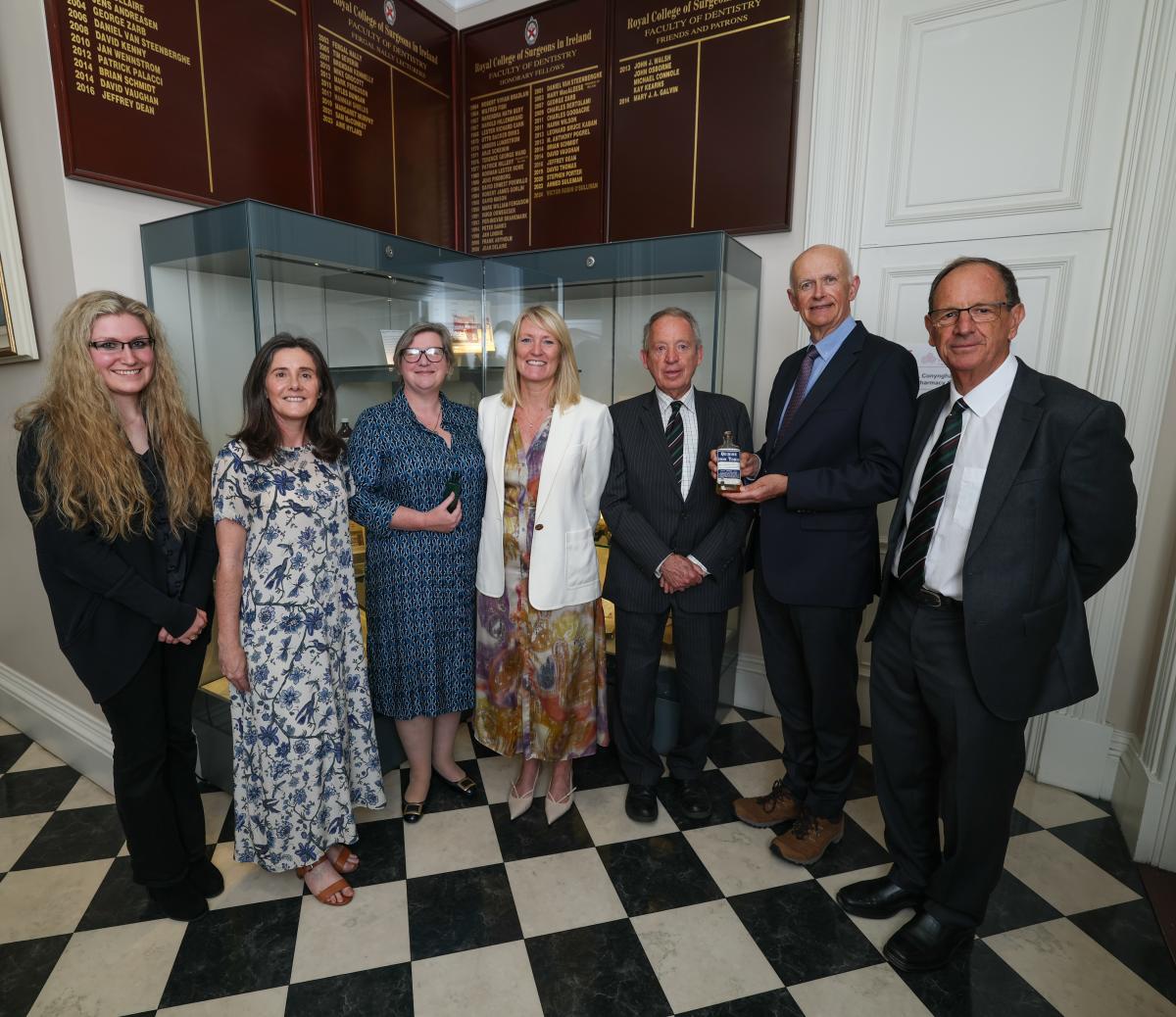
[From left to right: Erin McRae (Project Cataloguing Archivist), Professor Helena Kelly (Head of School, RCSI School of Pharmacy and Biomolecular Sciences), Professor Judith Strawbridge (Director of Education, RCSI School of Pharmacy and Biomolecular Sciences), Professor Tracy Robson (RCSI Deputy Vice Chancellor for Academic Affairs), Michael Shiell (Hayes, Conyngham & Robinson Pharmaceutical Chemists archive collection donor and ex-joint managing director of HCR), Professor Cathal Kelly (RCSI Vice Chancellor and Registrar) & Christopher Shiell (Hayes, Conyngham & Robinson Pharmaceutical Chemists archive collection donor and ex-joint managing director of HCR)] Copyright: Maxwell Photography
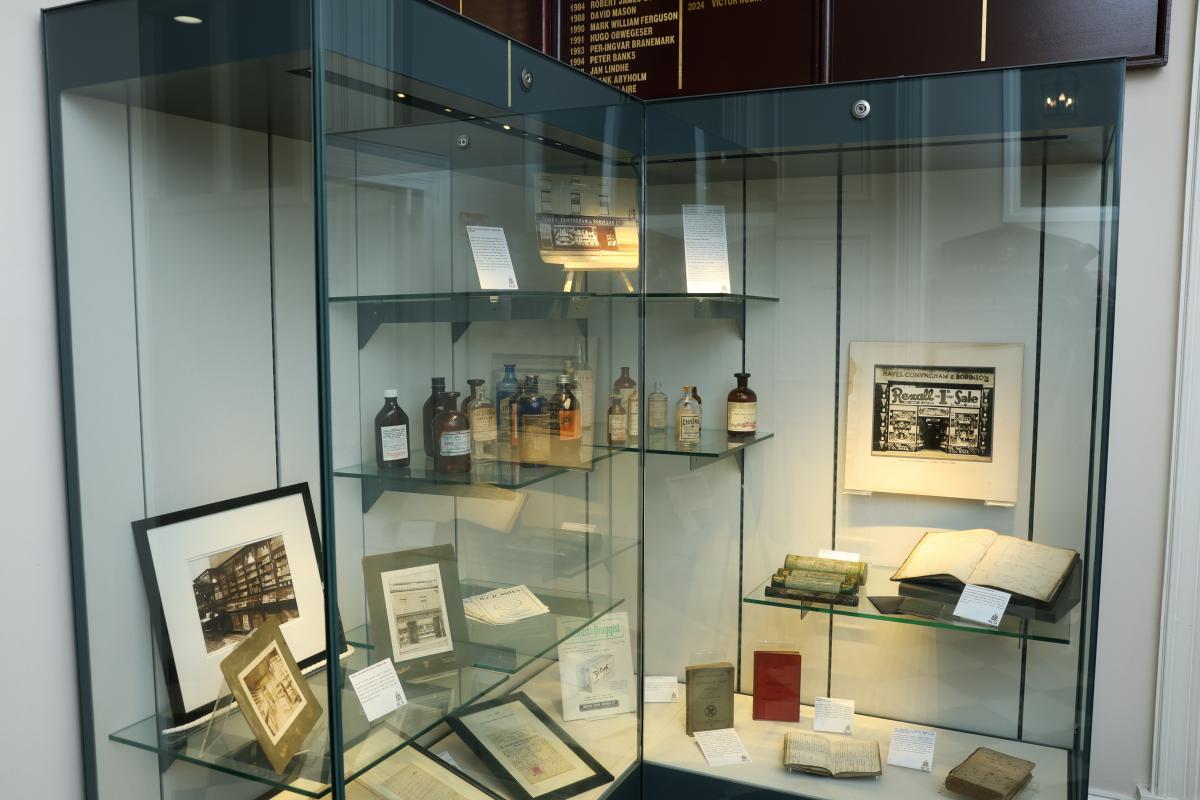
[Hayes, Conyngham & Robinson Pharmaceutical Chemists archive collection display, Royal College of Surgeons in Ireland, Dublin] Copyright: Maxwell Photography
A Merger of Chemists
HCR Pharmaceutical Chemists was founded in 1897 by William Hayes (1843-1918), Henry Conyngham (1845-1931) and Sir Thomas W. Robinson (1864-1946). Already established chemists, William Hayes bought a premise at 12 Grafton Street in 1864, and this eventually became the headquarters of HCR. Henry Conyngham acquired his medical hall in 1879 and was located on Upper Baggot Street and Sir Thomas Robinson had bought the branch business of John Evans in Kingstown (now Dún Laoghaire) in 1889. In 1897 they came together and decided to amalgamate their businesses which led to one-hundred years of business trading as Hayes, Conyngham & Robinson Ltd., or Hayes, Conyngham & Robinson Pharmaceutical Chemists. Some of the founders, most notably William Hayes and Sir Thomas Robinson, were active and involved in the wider pharmaceutical profession. The former was one of the founders of the Pharmaceutical Society of Ireland and a member of the first council of the society in 1875 where he remained a member of the society until 1895 and was elected its president in 1891. The latter was vice president of the Pharmaceutical Society of Ireland from 1891 to 1892 and president from 1938 to 1940 and he also served as an examiner in pharmacy as well as being the first president of the Dublin Drug Association, later renamed the Dublin & Provincial Retail Drug Association as it expanded and was founded in May 1909 (its successor was the Irish Drug Association (1935) and this organization was later incorporated into the Irish Pharmacy Union).1
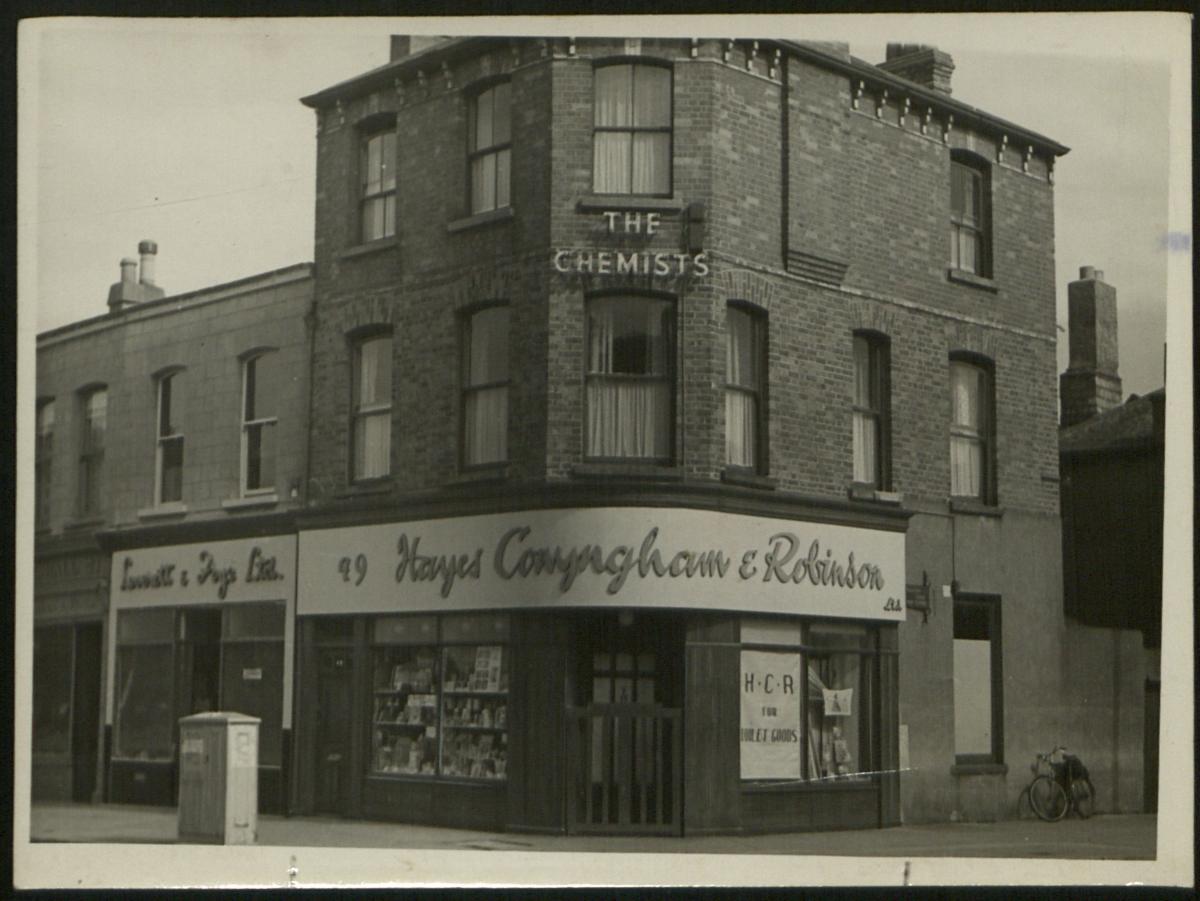
[RCSI_HCR_11_03_123 – Hayes, Conyngham & Robinson Pharmaceutical Chemists Branch at 49 Highfield Road, Rathgar, Dublin, dating between approximately 1950-1960]
The Evolution of Pharmacy in Ireland: The Case for Access to Contraception
The HCR collection charts the evolution of pharmacy in Ireland in the late 19th through to the end of the 20th century and the role of pharmaceutical chemists’ in promoting and serving public health. Movements and moments in the evolution of public health in the Republic also appear, and one that I found interesting and began researching further was the commercial selling of condoms in the Republic. The collection has an excerpt from an editorial which is titled: ‘Sale of Condoms’ (RCSI/HCR/02/02/18), and references that up until 1979 under Section 17 of the Criminal Law Amendment Act 1935 the importation and sale of contraceptives had been illegal, coupled with the Censorship of Publications Act 1946, which banned books about family planning or contraceptives. This meant that the Irish public had little access to resources and very limited control over planning their families and on their sexual relationships.2 After a series of legislation (Health (Family Planning) Act, 1980) and the Health (Family Planning) (Amendment) Act, 1985, the sale of non-medical contraceptives (condoms and spermicides) without a prescription to people over 18 at pharmacies was permitted, however it was still illegal to advertise contraceptives and use of the birth control pill remained restricted. In addition, the amended Act had an anomaly, and that was that while a pharmaceutical chemist and a dispensing chemist and druggist could sell contraceptives, any pharmacy owned by a limited company were still unable to sell contraceptives and HCR fell into this category. This excerpt, among other items in the collection, mark substantial advances and in some cases radical moments in the Irish public health landscape as well as important moments of social change and thinking.
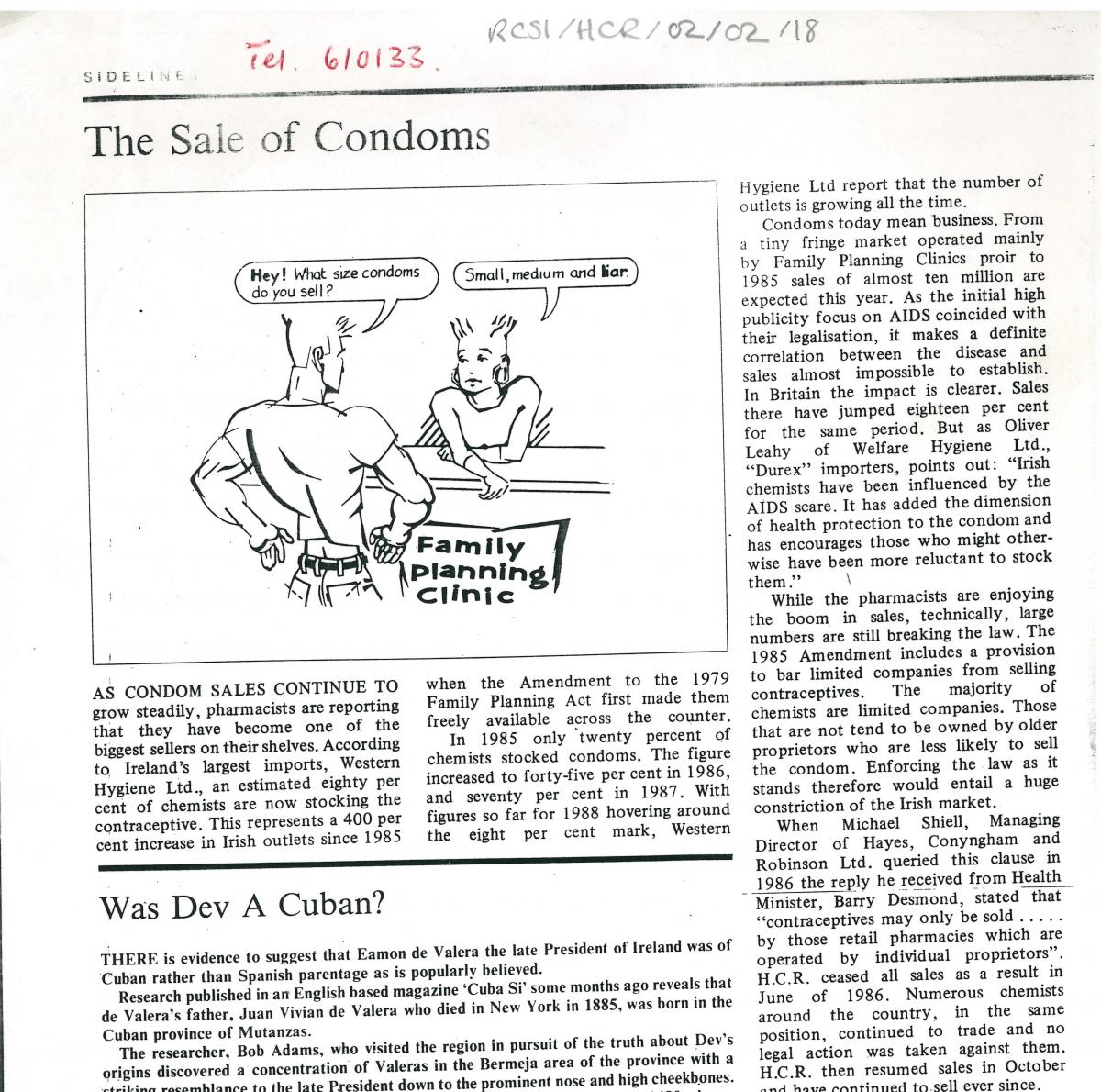
[RCSI_HCR_02_02_18 – ‘The Sale of Condoms’]
A Family Business
The collection also provides insights into the social lives of its founders, staff and those associated with the company as well as charting key events in the development of the Irish state and the effects these events had on HCR and its people. For example, the collection holds a first-hand account of the 1916 Easter Rising (RCSI/HCR/10/01/21) as experienced and witnessed by Frederick J. Robinson (son of founder Sir Thomas Robinson and a chemist in his own right). The collection also contains the personal photographs of the Robinson Family (RCSI/HCR/11/04) and includes albums and scrapbooks of their friends, family and travels which range in date from approximately 1880 to 1935. Ownership of the business remained within the same families for multiple generations, and many staff spent a significant portion of their careers working for HCR. The Heritage Collections team hope to work with the collection’s donors to record oral histories of employees who worked with HCR in the coming months as an additional resource to add to the collection. The collection is a rich addition to our knowledge of pharmacy and its development in Ireland particularly in the modern period and provides an additional resource to researchers for the study of the history of pharmacy in Ireland and the development of the pharmaceutical profession.
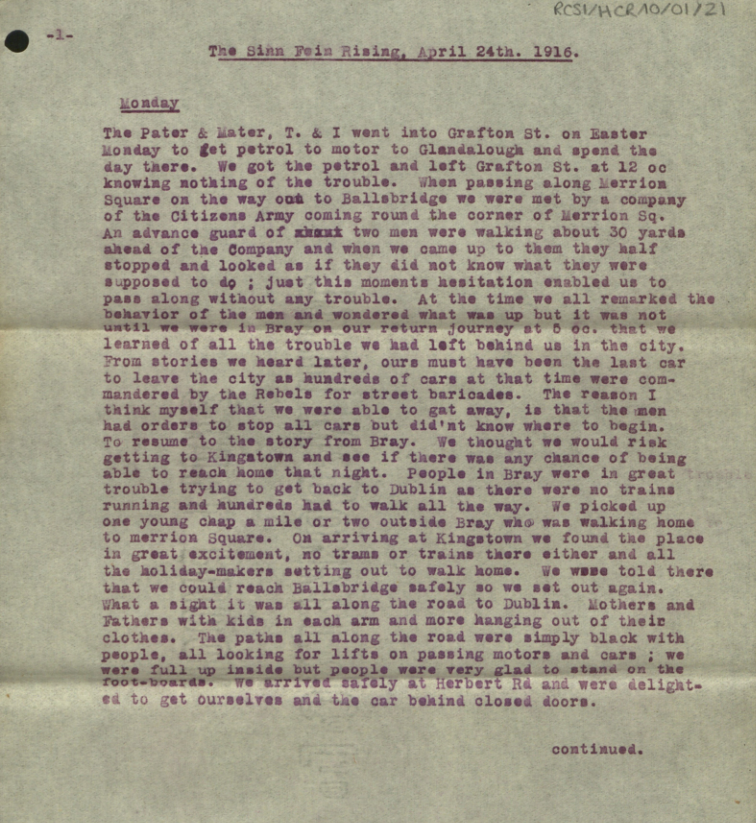
[RCSI_HCR_10_01_21 – 1916 Easter Rising ~ Frederick Robinson]
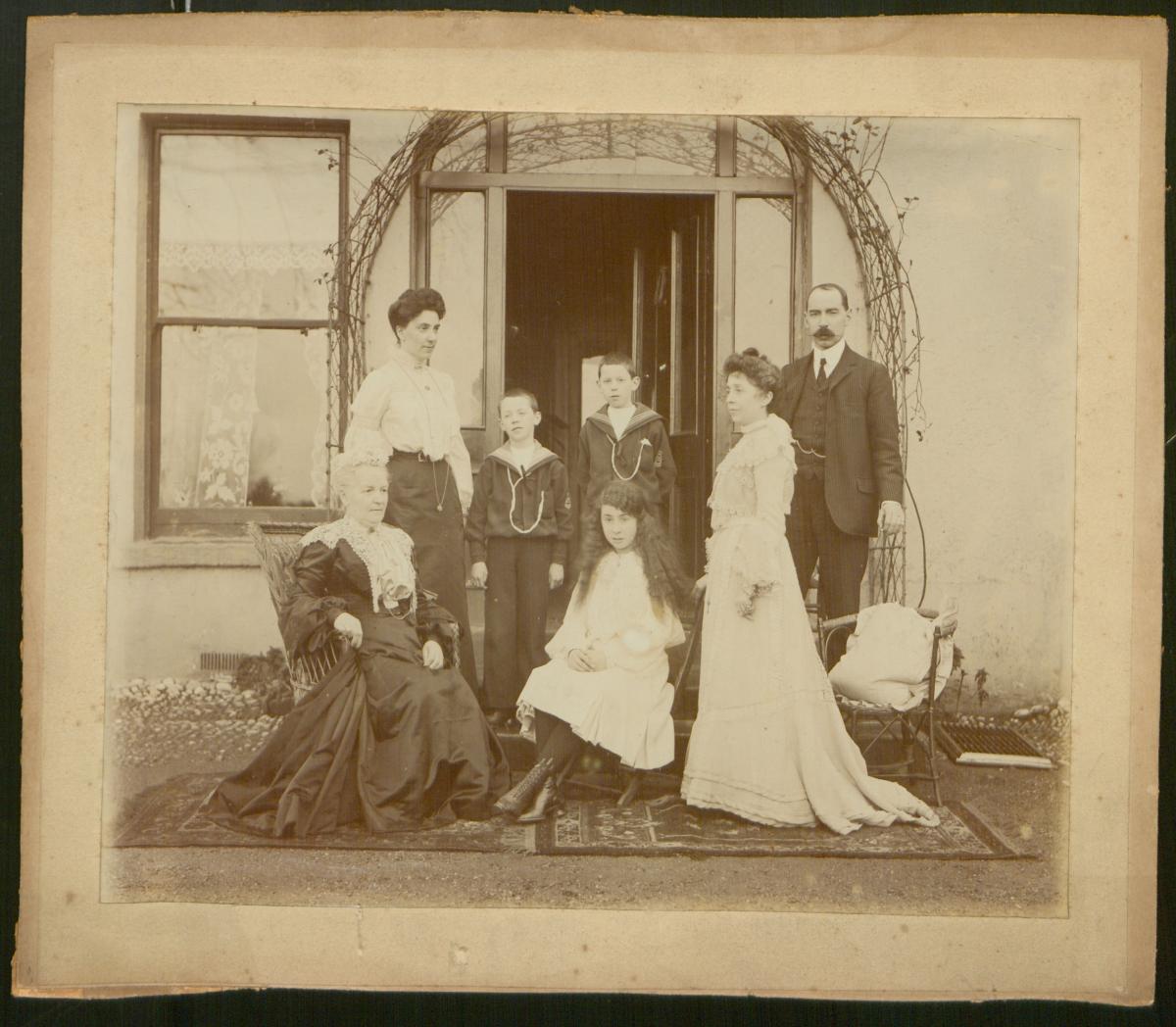
[RCSI_HCR_11_04_02 – Robinson Family Portrait]
The Hayes, Conyngham & Robinson Pharmaceutical Chemists Archive and RCSI Heritage Collections
The collection is a rich addition to our knowledge of pharmacy and its development in Ireland particularly in the modern period and provides an additional resource to researchers for the study of the history of pharmacy in Ireland and the development of the pharmaceutical profession. The records were in varied condition after being housed in unstable conditions for several years until intervention by the Shiells. The material has now been catalogued, cleaned and rendered stable. The collection is available to consult on the RCSI Heritage Collections online catalogue, and a selection of material has been digitized and made available on the RCSI Digital Collections platform.
References:
Hayes, Conyngham & Robinson Pharmaceutical Chemists Archive Collection (RCSI/HCR), RCSI Heritage Collections, Library, Dublin
Corrigan, Owen I. A Short History of Pharmacy in Ireland. Cork: Lettertec, 2023.
Kelly, Laura. Contraception and Modern Ireland: A Social History, c. 1922–92. Cambridge: Cambridge University Press, 2023.
“Irish Drug Association: Its Development from the Dublin and Provincial Retail Drug Association” The Chemist and Druggist 123, no. 2892 (1935): 62-63.
Health (Family Planning) (Amendment) Act, 1985
S.I. No. 248/1980 - Health (Family Planning) Regulations, 1980.
